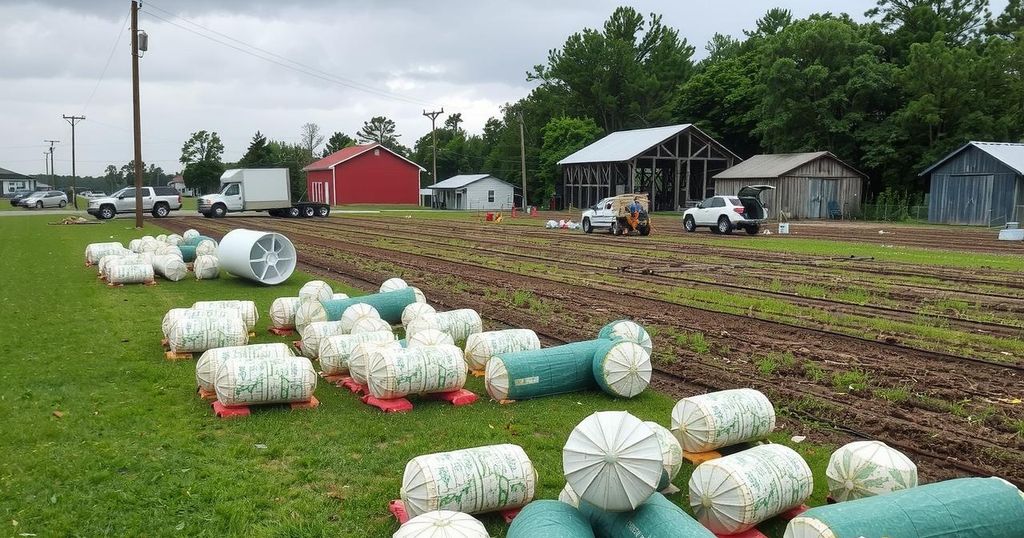Devastation Caused by Hurricane Helene: Impact on Georgia Farmers

Georgia farmers are struggling to recover from Hurricane Helene’s devastation, which caused over $5.5 billion in agricultural losses. The storm’s timing during the fall harvest intensified its impact, leading to significant losses in crops and poultry. Despite the urgency for recovery aid from state and federal sources, farmers express concerns over the emotional and financial toll of rebuilding their operations.
Farmers in Georgia are still grappling with the aftermath of Hurricane Helene, which wreaked havoc across the South, causing over $5.5 billion in losses to the agricultural sector. While twisted equipment and damaged fields remain visible months after the storm made landfall, the emotional toll on farmers remains significant. Many agricultural workers, like Chris Hopkins, are torn between rebuilding their operations or giving up entirely, adding to their distress amid a devastating harvest season.
Experts estimate that losses across impacted states could surpass $10 billion when accounting for damage to crops, timber, machinery, and additional indirect costs. The storm’s timing was detrimental, striking just as farmers began their fall harvests, forcing many to halt cleanup efforts to salvage what remained of their crops. For instance, Hopkins reported losing half of his cotton yield on 1,400 acres due to the storm’s destructive winds and heavy rains.
Despite having insurance, the recovery remains a challenge. Hopkins indicated that he may not reclaim approximately $430,000 of his losses, which exclude other expenses such as debris removal and machinery repairs. The breadth of Helene’s destruction extended beyond cotton fields, impacting pecan orchards, vegetable crops, and poultry houses, leading to significant losses across the region.
As the state government reallocates funds for emergency support and Congress passes a disaster aid package, farmers echo the urgent need for timely assistance. The poultry industry alone recorded an estimated $683 million loss, with reports of damaged chicken houses affecting production facilities reliant on these farms.
Although the storm may not sharply impact consumer prices due to crop availability from other regions, pecans could experience a notable price surge, given Georgia’s substantial contribution to national production. Agriculture experts contend that while the losses are profound for individual farmers, the broader market may stabilize to mitigate price fluctuations following such disasters.
In conclusion, Hurricane Helene left an indelible mark on Georgia’s agricultural landscape. Farmers are urgently seeking support to stabilize their operations as they navigate the dual challenges of recovery and rebuilding after an unprecedented storm. Farmers have emphatically expressed a unified sentiment of loss, resilience, and the pressing need for urgent recovery assistance as they confront the future of their livelihoods.
In late September 2018, Hurricane Helene made landfall in Florida as a major Category 4 storm, subsequently moving through Georgia and surrounding states, causing extensive damage to the agricultural sector. The destruction included not only crops but also farm equipment and poultry infrastructure. The storm occurred during a critical harvest period, exacerbating the losses that farmer faced. As the severity of the devastation became apparent, estimates indicated that the combined losses for farmers from Florida to Virginia could exceed $10 billion, compelling state and federal agencies to consider emergency relief measures and assistance packages.
Overall, the ongoing recovery efforts following Hurricane Helene reveal the deep vulnerabilities within the agricultural sector in Georgia. As farmers confront the losses of their livelihoods, the need for immediate and effective relief from both state and federal government remains essential to support their rebuilding efforts. The ability to recover hinges not just on financial support but also on the resilience and determination of farmers who continue to face unprecedented challenges.
Original Source: ktxs.com






